Round up a motley gathering of people in Srinagar – locals from all walks of life, tourists and outsiders who have made 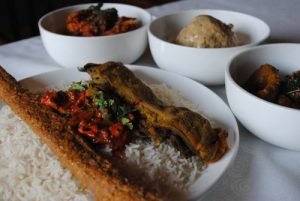 the city their temporary home for work or business – and ask them to name a few Kashmiri brands, chances are that not many will be able to remember any beyond the most obvious: Ahdoo’s. Named after the father of the founder of the bakery shop where the story started a century ago, Ahdoo’s has a brand recall for everyone who has visited Kashmir or who lives there. It refers as much to the courtyard where the city’s senior citizens gather for day-long tea sessions, as to the bakery shop where everybody goes to pick up buttery kulchas and tea cakes that no household in the city is without. It also refers to the iconic restaurant where locals and visitors alike make a beeline. And for regular visitors to Srinagar, the 24-room hotel is the most comfortable lodging, in
the city their temporary home for work or business – and ask them to name a few Kashmiri brands, chances are that not many will be able to remember any beyond the most obvious: Ahdoo’s. Named after the father of the founder of the bakery shop where the story started a century ago, Ahdoo’s has a brand recall for everyone who has visited Kashmir or who lives there. It refers as much to the courtyard where the city’s senior citizens gather for day-long tea sessions, as to the bakery shop where everybody goes to pick up buttery kulchas and tea cakes that no household in the city is without. It also refers to the iconic restaurant where locals and visitors alike make a beeline. And for regular visitors to Srinagar, the 24-room hotel is the most comfortable lodging, in  the most central location that you can have, at a price that will not break the bank, although the hotel is the newest addition to the original brand.
the most central location that you can have, at a price that will not break the bank, although the hotel is the newest addition to the original brand.
The journey started in 1918, when a young man, Muhammad Sultan Bhat, started a cake shop in Polo View, selling tea cakes, biscuits and shortbread to an entirely English clientele, Polo View being near the Golf Club and the westernized parts of the city. M. Sultan named his bakery after his father, Abdul Ahad, the diminutive form for which is Ahdoo. In the last one century, it was this name that continued, like a magic mantra, without a break: the bakery with an adjoining restaurant moved locations at least once, to the location opposite the present establishment. In 1944, the bakery and 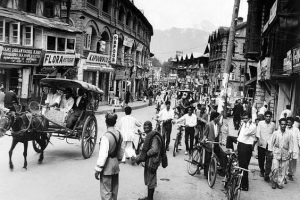 restaurant was re-located across the road and a couple of guest rooms were constructed almost as an after-thought. Meanwhile, a few hotels and guest houses were added to the family’s portfolio and were lost, with the vicissitudes of time, though they did not carry the magic Ahdoo’s name, being managed by other members of the family.
restaurant was re-located across the road and a couple of guest rooms were constructed almost as an after-thought. Meanwhile, a few hotels and guest houses were added to the family’s portfolio and were lost, with the vicissitudes of time, though they did not carry the magic Ahdoo’s name, being managed by other members of the family.
Before 1947, the customers who visited Ahdoo’s restaurant were almost entirely English; there even was a band in attendance that played in the evenings. After Partition, when the British population of Kashmir left, the band left too; attempts to replace it with musicians 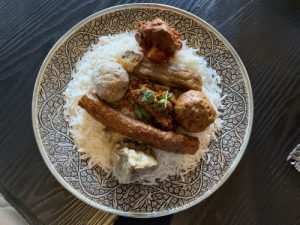 from Kolkata did not find favour with the locals, who had, by then, begun to visit Ahdoo’s in greater numbers. Today, depending on the season and the time of the day, you will see locals, for whom a day is incomplete without tea and butter toast at Ahdoo’s, tourists – they will be the ones engaging the waiters in lengthy conversation – and regular visitors to Srinagar for either business or leisure.
from Kolkata did not find favour with the locals, who had, by then, begun to visit Ahdoo’s in greater numbers. Today, depending on the season and the time of the day, you will see locals, for whom a day is incomplete without tea and butter toast at Ahdoo’s, tourists – they will be the ones engaging the waiters in lengthy conversation – and regular visitors to Srinagar for either business or leisure.
Chances are that you are visiting the restaurant to sample the wazwan – those dishes that are integral to a wedding feast, where freelance cooks, working in teams, prepare a banquet of several courses that famously uses every part of the sheep. Each host family can decide their own menu, and Ahdoo’s expectedly has a dozen of the most popular dishes: methi maaz, tabak maaz, yakhni, dhaniwal korma, rista, gushtaba, mirchwangun 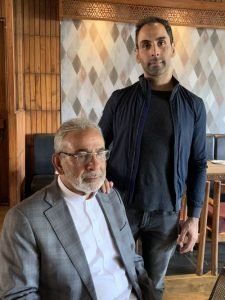 korma, mutch kebab. Every last dish glorifies one or the other cut of lamb, the lone exception being ruwangun tchaman or tomato paneer. It is the method of cooking, the accompanying spices and flavouring that is added that makes one preparation so different from the other. Rista and gushtaba feature boneless meat that is pounded for hours before being formed into meatballs, but while one is made with meat stock and chillies added to water (Kashmiri chillies famously leach their colour into the water they’re soaked in, adding colour but little heat), gushtaba gravy is just reduced curd with aromatic spices. Mirchwangun korma is the spiciest of them all, using chillies, with their seeds, while methi maaz contains organ meats and dried fenugreek leaves. If all you want in Ahdoo’s is a snack, there are those too: seekh kebabs and chicken or mutton kanti kebabs. Those too are considered snacks with a cup of tea.
korma, mutch kebab. Every last dish glorifies one or the other cut of lamb, the lone exception being ruwangun tchaman or tomato paneer. It is the method of cooking, the accompanying spices and flavouring that is added that makes one preparation so different from the other. Rista and gushtaba feature boneless meat that is pounded for hours before being formed into meatballs, but while one is made with meat stock and chillies added to water (Kashmiri chillies famously leach their colour into the water they’re soaked in, adding colour but little heat), gushtaba gravy is just reduced curd with aromatic spices. Mirchwangun korma is the spiciest of them all, using chillies, with their seeds, while methi maaz contains organ meats and dried fenugreek leaves. If all you want in Ahdoo’s is a snack, there are those too: seekh kebabs and chicken or mutton kanti kebabs. Those too are considered snacks with a cup of tea.
Say Ghulam Hasan and his son, Hayat Bhat, the present owners, “More than those visitors that we have welcomed through our doors, are the ones that were hesitant to visit for fear of getting mobbed. Aamir Khan and Shah Rukh Khan have ordered food from us to be delivered 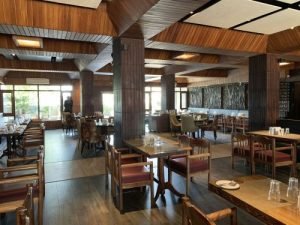 to their respective hotel rooms at different times.” Other prominent guests have included names from Bollywood like Aliya Bhatt and Shahid Kapoor, captains of Indian industry like Cyrus Mistry; heads of foreign missions like the UK High Commissioner and the US Ambassador.
to their respective hotel rooms at different times.” Other prominent guests have included names from Bollywood like Aliya Bhatt and Shahid Kapoor, captains of Indian industry like Cyrus Mistry; heads of foreign missions like the UK High Commissioner and the US Ambassador.
Even after the most recent renovation two years ago, the spacious proportions of the restaurant speak of an older era. And the waiters, many of whom are in their 70s, add a certain gravitas to the restaurant. Srinagar is not the easiest city to run an establishment that requires service staff; the decades of strife have made sure of that. But, it is the old guard that is holding the flag high, giving Ahdoo’s its undeniable edge.
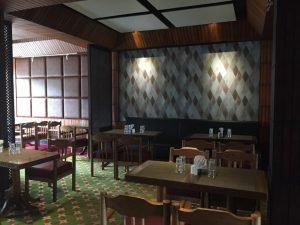 In the difficult 1990s, when Ahdoo’s was the lone hotel that was open throughout the year, it was filled with correspondents and television crew from various media houses across the country. When the day was done, the journalists would often compare notes with other members of their fraternity. In many cases, it was noticed that details in news reports would be bear a striking similarity. And the term ‘Ahdoo’s Journalism’ was famously coined.
In the difficult 1990s, when Ahdoo’s was the lone hotel that was open throughout the year, it was filled with correspondents and television crew from various media houses across the country. When the day was done, the journalists would often compare notes with other members of their fraternity. In many cases, it was noticed that details in news reports would be bear a striking similarity. And the term ‘Ahdoo’s Journalism’ was famously coined.
Today, you will see Kashmir-based families dining at this landmark restaurant; tourists making a bee-line to be able to tick off a box from their must-visit list; bureaucrats, Government contractors and local businessmen huddled together, discussing deals in whispered tones, and yes, even the occasional table of journalists. Who knows! They might even be indulging in some Ahdoo’s journalism!








